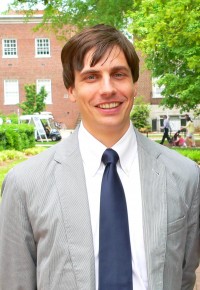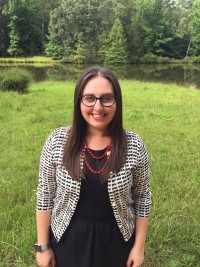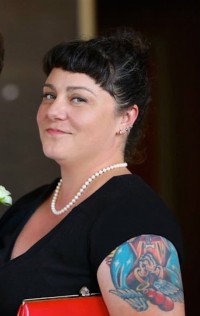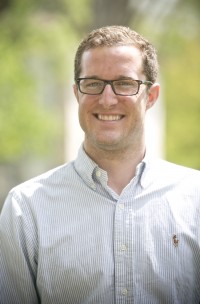Continuing Education: Southern Studies Alums Pursue Doctorates, Write Dissertations
This article, by Rebecca Lauck Cleary, originally appeared in the Summer 2015 edition of the Southern Register.
Continuing Education: Southern Studies Alums Pursue Doctorates, Write Dissertations
While a Master of Arts degree can be the pinnacle of schoolwork for some students, others continue their foray through academia. Here are a few of the Southern Studies alums who, having decided to pursue a PhD in various fields, are working on or have nearly completed their dissertations. The MA program is known for producing graduates with diverse interests, and these topics reflect that diversity.
 Joseph Thompson is a doctoral student in the Corcoran Department of History at the University of Virginia, with a dissertation tentatively titled “Sounding Southern: Popular Music, Antistatism, and the Sunbelt South, 1954–1994,” which examines the cultural reactions to state expansion in the Sunbelt.
Joseph Thompson is a doctoral student in the Corcoran Department of History at the University of Virginia, with a dissertation tentatively titled “Sounding Southern: Popular Music, Antistatism, and the Sunbelt South, 1954–1994,” which examines the cultural reactions to state expansion in the Sunbelt.
Thompson’s Southern Studies thesis provided a great springboard into his dissertation topic. “That project explored Civil War memory through a Reconstruction-era song called ‘I’m a Good Old Rebel’ that has functioned as an anthem for neo-Confederates throughout the twentieth century,” Thompson said. “I argued that the ‘Good Old Rebel’ creates an aural space in which artists and audiences perform an idealized version of white Southern identity that combines antistatist sentiment with white supremacy to perpetuate the political agendas of the unreconstructed South—an unfortunately timely topic in the wake of the Charleston massacre.”
When Thompson arrived at UVA, he continued to pursue the intersection of music, race, and regional identity, and based his project around the 1956 attack on Nat “King” Cole by a group of neo-Confederates from Anniston, Alabama. “I expected to use this work to investigate the North Alabama Citizens’ Council, to which the attackers belonged, and to figure out why these men targeted Cole of all people,” he said. “The dissertation continues this line of analysis by looking at the cultural consequences for the South’s economic dependence on defense spending in the last half of the twentieth century. Music factors into this project as a particularly revealing medium through which Southerners of all races and political persuasions negotiate their regional identity in response to the presence of the federal government as embodied in the military-industrial complex.”
He met his UVA dissertation advisor, Grace Hale, in Oxford when she delivered the 2012 Gilder-Jordan lecture, cosponsored by the Center. He is also the Southern American Studies Association’s 2015 recipient of the Critoph Prize, which honors the best paper by a graduate student.
 After receiving her MA in Southern Studies, Kari Edwards stayed on at the University of Mississippi. She entered the history PhD program and, after passing her comps in May, started the preliminary work on her dissertation research. Her topic deals with the space race and the relationship between religion, science, and technology in Cold War–era America.
After receiving her MA in Southern Studies, Kari Edwards stayed on at the University of Mississippi. She entered the history PhD program and, after passing her comps in May, started the preliminary work on her dissertation research. Her topic deals with the space race and the relationship between religion, science, and technology in Cold War–era America.
“I’m hoping to look at the role the US space program played in bolstering the importance of scientific research within American culture beginning in the late 1950s with the Soviet launch of Sputnik, as well as the religious significance that space exploration and the race against Soviet technology took on during the Cold War,” Edwards said.
Her Southern Studies thesis was on the Scopes Trial, so her work is still primarily concerned with debates over science and religion, and with Ted Ownby as her dissertation director and Darren Grem and Charles Reagan Wilson as committee members, she still stays affiliated with Southern Studies.
Mel Lasseter is in the American Studies Department at the University of North Carolina-Chapel Hill, and the title for her dissertation is “Epistemologies of Absence: Comings and Goings through the Sonic Arboretum.” The dissertation will analyze Southernness, mobility, and interdependence, with one primary goal being to develop a way of thinking about the South and Southern Studies that moves beyond a black-white racial binary.
“Some of the essay topics include professional ice hockey in the South, blues collectors in the files of the Mississippi State Sovereignty Commission, and reading Faulkner as high fantasy (sword and sorcery style),” Lasseter said. “They will be tied together with a framework based on an art exhibition called Sonic Arboretum co-mounted by Andrew Bird in Chicago, Boston, and New York City.” Her Southern Studies MA thesis was on Bird, and this framework expands on her thesis. “Much of my thinking is also informed by Katie McKee’s seminar on globalization and the US South,” she said.
Lasseter passed her comps in February and defended her prospectus in May. She is reading contemporary philosophy and researching critical race theory while also working in the archives at MDAH. The chair of her committee is Southern Foodways Alliance board member Elizabeth Engelhardt, and former Center Director Bill Ferris is also on the committee.
 Jennifer “Bingo” Gunter is a PhD candidate in history at the University of South Carolina, with a dissertation titled “Sex and the State: Successful Reforms of the Women’s Movement in 1970s South Carolina.” She has taken her Southern Studies work and continued to discuss the role of feminism and feminists in the South.
Jennifer “Bingo” Gunter is a PhD candidate in history at the University of South Carolina, with a dissertation titled “Sex and the State: Successful Reforms of the Women’s Movement in 1970s South Carolina.” She has taken her Southern Studies work and continued to discuss the role of feminism and feminists in the South.
“My dissertation examines the successes of the feminist movement, which have often been overlooked in the examination of the failure of the Equal Rights Amendment,” Gunter said. “By focusing on the establishment and creation of legal and medical protocols for rape victims (including the creation and implementation of rape crisis centers, rape kits for emergency rooms, and hotlines), access to safe and legal abortions, and law reform and victim support in cases of domestic violence and rape, the dissertation tells the story of ordinary Southern women doing extraordinary work.”
Gunter has conducted several oral histories for the project, including one with the woman who may have created the first rape kit. Her dissertation also utilizes other primary sources, such as newspaper reports and personal collections.
In addition to her doctoral studies, she is working on a moveon.org petition to remove the Confederate flag from the Mississippi state flag. “I believe it is time for it to come down across the South, and it is a way to pay homage to the Emanuel nine in Charleston—a way to finally move away from our racist past,” Gunter said. “So, I started a petition calling to change the Mississippi state flag. I thought that enough hearts and minds would be moved to take action, and it’s working—though racism is again rearing its very ugly head.”
 Alan Pike graduated with a PhD in American studies from Emory University’s Graduate Institute of Liberal Arts in May, and he is beginning a full-time position as the digital scholarship training coordinator at the Emory Center for Digital Scholarship later this month.
Alan Pike graduated with a PhD in American studies from Emory University’s Graduate Institute of Liberal Arts in May, and he is beginning a full-time position as the digital scholarship training coordinator at the Emory Center for Digital Scholarship later this month.
Pike’s dissertation, “Locked Up: The Prison Genre in American Cinema,” focuses on the origins and development of the prison genre in Hollywood films from the early 1930s until the prison genre migrated from the big screen to television in the 1990s. “This is an extension of my Southern Studies MA thesis, which was itself an extension of a Southern Studies seminar paper,” he said. “The dissertation pays close attention to how regional differences are represented in prison films and how the ways that the South is ‘imagined’ in popular culture impacted how Southern prisons appear on screen.”
Pike said the research process was a long and meandering one, and although he originally wanted to focus almost exclusively on Southern prison films, he felt it would make a more substantial contribution if the focus expanded. “In addition to watching tons of prison films, the bulk of my archival research was focused in the collections of the Margaret Herrick Library’s collection of papers from the Studio Relations Committee, a division of the Motion Picture Producers and Distributors of America trade group appointed to enforce Hollywood censorship standards,” Pike said.
